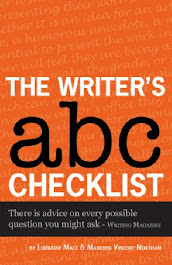A warm welcome to my blog guest and very good friend, Lorraine Mace. Lorraine is an experienced writer, writing tutor and humour columnist as well as the co-author of The Writer’s ABC Checklist. Here she gives us some excellent advice on how we can get the most from a critique.
Critically Speaking
In the course of my work I get to see a lot of rewritten stories and novels and I’m always astounded at how quickly writers resubmit after receiving a critique.
Considering the writers are coughing up good money for the benefit of someone’s advice, it seems a bit odd not to take the time to at least digest the comments and suggestions. All too often, within a few days of a critique going out, the story reappears in my inbox (often with a note saying it has been rewritten following the advice given). Um, no, usually all that has happened is a few minor corrections have been made to tidy things up, but the major errors to do with plot, characterisation, dialogue and other important factors remain.
So, here’s some advice on how to get the most from a critique, whether it has been paid for, given freely on a peer review site, or is feedback from a writing buddy.
Do Nothing
That’s right. Do nothing. Don’t set to and rewrite immediately. Take a few days to read and reread the comments and suggestions. Only after absorbing the feedback and letting it run through your subconscious will you be able to decide which aspects of the criticism are valid and which would take your work in a direction you don’t want it to go.
Make Notes
Once you’ve absorbed the criticism, make notes on how to deal with it. How are you going to fix the plot holes? What layers can you add to give depth to the storyline? How are you going to flesh out the characters to make them less wooden? What can you do to improve the dialogue? How can you make transitions into and out of flashbacks smoother? What can you do to improve the settings? How can you balance telling and showing?
On this last point, don’t let anyone tell you that you should always show and not tell. A piece of advice given to me some time ago, which I felt summed up the balance perfectly, is to show (using dialogue and interaction to dramatise) what’s important and to tell (using narration to link dramatised scenes) what isn’t.
Rewrite
Okay, now you have your notes, it’s time to rewrite. If you’ve followed steps one and two above you should now be in a good position to make a really good job of the rewrite.
Be Patient
Put your rewritten story out of your mind for a few weeks. Don’t read it again until at least a week has gone by, but the longer you can leave it, the better it will be for you. It’s impossible to read something objectively too soon after you’ve been working on it. Take the time to write something new – or rewrite another story.
Read Critically
Get out the original critique and your notes and read your story with these in mind. Have you covered everything? If you stumble over a minor point, don’t tell yourself it’s nothing to worry about – make notes on how to fix it.
Finished? Nope, not even close. Repeat steps 1-5 until the story is the best it can possibly be. Then, and only then, resubmit it to the competition. However, by then it might be so good that you could submit it to a competition with even better prize money.
Lorraine Mace is the co-author of The Writer’s ABC Checklist, a columnist with Writing Magazine and writing agony aunt for Words with JAM. She has had fiction published in various magazines including That’s Life, The Lady, My Weekly and Ireland’s Own. Lorraine, a tutor for Writers Bureau, is part of the Freelance Market News appraisal panel for both fiction and non-fiction. A writing competition judge and member of the short story critique team for Writers’ Forum, she also runs her own critique service for writers.
Critique Service
Flash 500 Flash Fiction Competition
Flash 500 Humour Verse Competition.

































7 comments:
Thanks for the great advice, Lorraine - now it's putting it into practice that's needed!
Thanks for this advice. I paid for a critique of my children's novel back in June; it was mainly positive but a number of recommendations with which I do agree and which will require some serious work. Shelved it for a while as you say, did other things, and now gearing up for some serious editing. Hope it will end up as the start of a series. Optimism is my forte! Thanks again for posting.
Wonderful tips . . Always good to get a seasoned writer's perspective:)
HI Lorraine,
Thanks for this link. I think this would be really good. I have added this to my bokmarks.
Arti
Thanks for that Lorraine...It resonated!
Very helpful. Now to put into practice..
Sheena Cundy
Thanks Lorraine for your critique of my story. And also for the link to the blog post. I was concerned that I was taking too long to rewrite but I see now that it's best to take time.
Hi Lorraine
Many thanks for your insightful comments on 'The Child Minder'
I will spend some time on it and possibly resubmit it.
Tony Eaton-Baudains.
Post a Comment